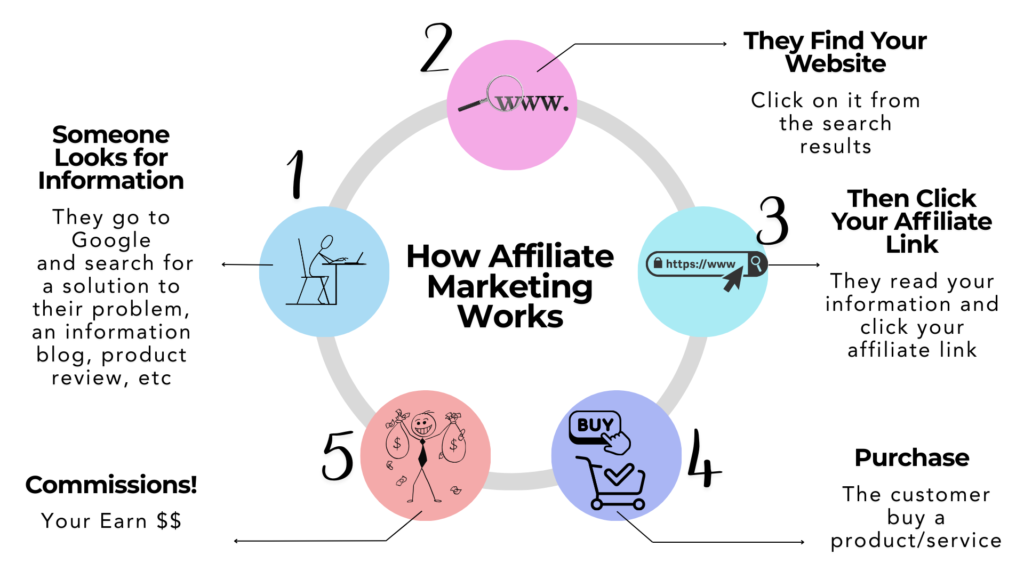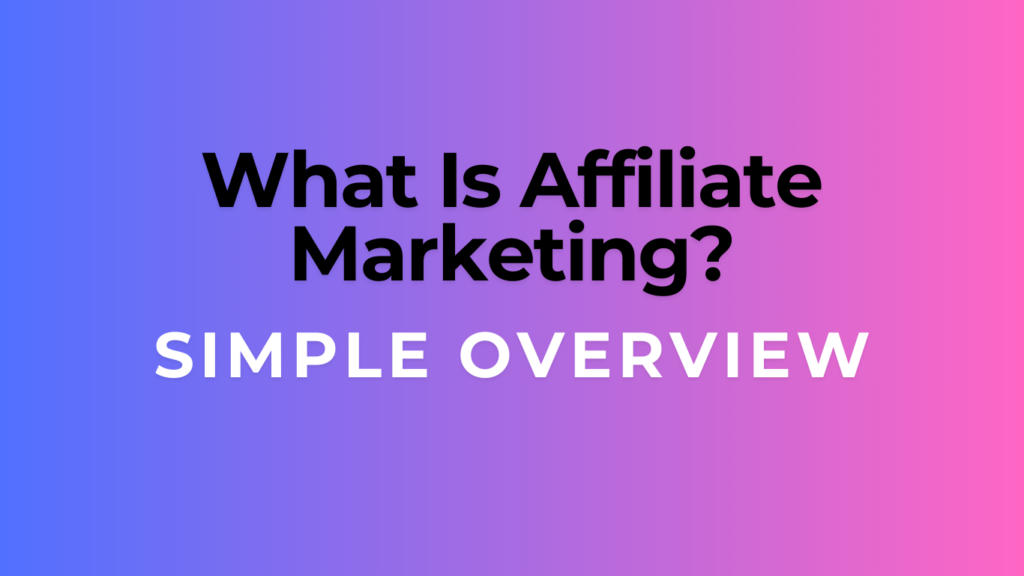Affiliate marketing is like when you tell your friend about a really cool makeup brush you have and they buy it because you told them. Then, the makeup company gives you a little bit of money for telling your friend about the brush. It’s like getting a reward for sharing something you like with others.
It’s actually pretty straightforward once you get the hang of it. At its core, affiliate marketing is a way for brands (Like Nike) and retailers (Like Target) to reach more people by partnering with individuals (Like Yourself) or businesses, otherwise known as affiliates. These affiliates (You) help promote products and, in return, earn a commission for their efforts.
So, who’s involved in this whole process? Well, there are three main players:
merchants
affiliates
and consumers
Merchants

Merchants are like the unsung heroes of the business world, the ones who actually have the products or services that everyone else is clamoring for. They’re the ones who bring your favorite items to life, whether it’s that must-have gadget or the latest fashion trend. Without merchants, we’d all just be stuck staring at empty store shelves, dreaming of all the things we wish we could buy. So next time you see a merchant hustling on a street corner or running an online shop, remember to give them some love – because they’re the ones making your shopping dreams come true!
Affiliates

Affiliates are the ultimate middlemen or women who have perfected the art of persuasion. These savvy individuals know how to seamlessly integrate promotional content into their own platforms, making it seem like they’re doing a favor rather than selling a product. They have a magical ability to tap into their audience’s wants and needs, convincing them that this new product is just what they’ve been missing in their lives. It’s like watching a master magician at work, except instead of pulling rabbits out of hats, they’re pulling in sales left and right. So next time you see an affiliate post pop up on your feed, give them a virtual high five for working their magic behind the scenes.
Consumers

Then you’ve got the consumers, who are just regular folks browsing online, scrolling through the internet, looking for something cool to buy. Their eyes catch a glimpse of an affiliate’s link subtly embedded within the content they’re perusing. Intrigued, they click on it, unknowingly setting into motion a chain of events that will ultimately lead to them making a purchase.
Relationships are key in affiliate marketing. Affiliates often select products that align with their brand or audience, creating a trust-based connection.
This means when they promote something, their followers are more likely to click through and buy because they value the affiliate’s opinion.
Sometimes, affiliates are even given unique links or codes to share, making the buying process smooth and trackable for both the merchant and the affiliate.
It’s all about teamwork and mutual benefits, making everyone involved happy.
How Affiliate Marketing Functions: Mechanism & Examples
Affiliate marketing isn’t just a sales pitch—it’s a strategy that operates like a well-oiled machine. Breaking it down, here’s how it typically goes down.
First, the affiliate picks a product they believe in and shares it with their audience using a unique affiliate link.
When someone clicks on that link and makes a purchase, the sale is tracked back to the affiliate, earning them a commission.
This is what the whole process looks like…

Now, imagine a blogger who loves fitness gadgets. They could join an affiliate program for a brand selling the latest smartwatch. They’d write a compelling review or create an Instagram post, sprinkling in their affiliate link. If their followers end up buying the smartwatch through that link, the blogger earns a slice of the sale. That’s affiliate marketing in action!
Affiliate marketing is huge online, weaving through blogs, YouTube channels, and social media platforms. You might have seen it in the wild without even realizing it. Think of those discount codes from influencers. They promote a product, you apply their code, and they get rewarded for your purchase—it’s seamless yet impactful.
Tracking these affiliate sales is crucial. This is done through cookies or digital identifiers embedded in those unique links. Allowing merchants to see exactly how much traffic and sales came from a specific affiliate. This transparency is why so many retailers love working with affiliates and why affiliates are more than happy to promote products they trust and want others to trust too.
Starting Affiliate Marketing as a Beginner

Jumping into the affiliate marketing world as a newbie might seem a bit overwhelming, but it’s totally doable with the right approach and resources.
First off, there’s no need to drain your bank account. Many platforms, like Wealthy Affiliate, offer free or low-cost training sessions to get you up and running.
Udemy also has free affiliate marketing courses for beginners. These programs guide you through the ins and outs, teaching you how to pick products, create content, and reach potential buyers.
If you’re not sure if a program is legit, just check out their ratings on Trustpilot, the BBB, or from other users. This can help you figure out if it’s worth spending your money on.
You don’t always need a fancy website to start earning. Social media is a goldmine for affiliate marketers just starting out.
Platforms like Facebook let you join niche groups where you can drop valuable content and, of course, your affiliate links.
TikTok, on the other hand, is all about creativity. Short, engaging videos can reach thousands, if not millions, and drive them to the products you’re promoting.
For those who prefer the classic blog route, it’s wise to focus on a particular niche you’re passionate about.
When you love what you’re talking about, it shows, making your recommendations genuine and trustworthy.
Pick products that resonate with your interests and audience, and slowly build your affiliate empire from there.
Keep in mind that patience and perseverance are key. Results won’t come overnight, but if you stay consistent and keep learning, you’ll likely see growth.
Engaging with your audience and providing value in every interaction is crucial. This builds trust and encourages your followers to take that leap and make a purchase through your links.
Pros and Cons of Affiliate Marketing
Benefits of Affiliate Marketing:
Earn passive income, work from anywhere with an internet connection, and bask in the warm glow of knowing you’re helping connect people with products they need. It’s like being Cupid but for shopping.
Challenges and Drawbacks of Affiliate Marketing:
Be prepared for the occasional sleazy affiliate marketer sliding into your DMs, the uncertainty of whether your efforts will pay off, and the constant battle to stand out in a sea of ads and promotions.
With any kind of online business, there will always be pros and cons. What matters is how you approach challenges so in the end you can win and find success
Common Mistakes to Avoid in Affiliate Marketing
Nobody likes a pushy salesperson, right? Don’t bombard your audience with affiliate links left, right, and center. Balance is key. Integrate your affiliate promotions seamlessly into your content, and always prioritize providing value over making a quick buck. Overpromoting or Spamming Products
Ignoring Compliance and Disclosure Requirements
Did you know there are rules and regulations in the affiliate marketing universe? Yep! Always disclose your affiliate relationships transparently to your audience. Follow the FTC guidelines, comply with program terms, and avoid sneaky practices. Trust and authenticity go a long way.
ignoring
Is Affiliate Marketing Right for You?
Is affiliate marketing your cup of tea? Let’s do a quick self-assessment.
Assessing Your Skills and Resources:
Take stock of your skills, resources, and strengths. Are you a content powerhouse? Do you have a knack for building relationships? Assess what you bring to the table and how you can leverage these assets in your affiliate marketing journey.
Determining Your Commitment and Expectations:
Affiliate marketing isn’t a get-rich-quick scheme (spoiler alert!). It requires time, effort, and patience to see results. Evaluate your commitment level and set realistic expectations. Rome wasn’t built in a day, and neither is a successful affiliate marketing business
Affiliate marketing has evolved, becoming a staple in today’s digital ecosystem.
For success in affiliate marketing, ongoing learning is crucial. Investing time in training sessions and staying updated with industry trends can pay off big time.
Look for platforms that offer resources and a community that’s ready to support newcomers.
Experiment with your approach, and continually adapt to what resonates most with your audience.
In conclusion, affiliate marketing can be a viable revenue stream for those willing to put in the time and effort to build relationships, create valuable content, and optimize their strategies.
By understanding the basics, weighing the pros and cons, and avoiding common pitfalls, individuals can determine if affiliate marketing is the right fit for their online business endeavors.
Whether you’re a seasoned digital marketer or a newcomer exploring new opportunities, affiliate marketing offers a flexible and scalable way to generate income in the ever-evolving digital landscape.
Frequently Asked Questions (FAQ) About Affiliate Marketing
1. How much money can I make through affiliate marketing?
Affiliate marketing income varies based on factors such as your niche, audience size, and promotional strategies. Some affiliates earn a modest side income, while others generate substantial revenue streams. Success in affiliate marketing often hinges on consistent effort and effective marketing tactics.
2. Do I need a website to succeed in affiliate marketing?
While having a website can enhance your affiliate marketing efforts, it is not a strict requirement. Affiliates can leverage social media platforms, email marketing, and other channels to promote affiliate products. However, a website can provide a centralized hub for showcasing products and building credibility with your audience.
3. Are there any costs associated with becoming an affiliate marketer?
Joining affiliate programs is typically free, but there may be costs associated with setting up and maintaining your online presence, such as domain registration, web hosting, and marketing tools. It’s essential to consider these expenses when planning your affiliate marketing budget.
4. How long does it take to see results in affiliate marketing?
The timeline for seeing results in affiliate marketing varies depending on various factors, including your niche, marketing strategy, and audience engagement. Some affiliates may start earning commissions within a few months, while others may take longer to build a consistent income stream. Consistency, experimentation, and adaptation are key to achieving success in affiliate marketing.
We wish you all the success on your affiliate marketing journey, if you have any more questions please leave them below.

